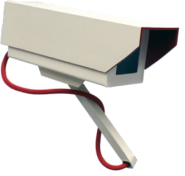Research in Motion: the surveillance workplace


We, the students, as the next generation of IT users, are already in a state of disarray when it comes to the surveillance state, with cameras and devices monitoring our movements and tracking us through the street.
Is the surveillance workplace the next step forward, or if anything, is it a giant step back?
Robin Bienfait, the CIO of RIM, said "that every type of communication whether it be private call, e-mails, or text messages, made by employees of RIM, is recorded and documented." There is, of course, a way around this by bringing in a personal device to make personal phone calls, text messages and emails, but there are two distinct perspectives to take.
The business perspective: where according to the ZDNet article:
"They're doing business inside of RIM. Everything they can say or do can be patented... We're not violating anybody's privacy. They're aware that their information is transparent and in visibility."
The company does rely on intellectual property as the company holds a massive mobile device marketshare, and with everyone foaming at the mouth of the thought of owning a BlackBerry, they have to keep their secrets to themselves. Pre-release devices and beta products could easily go walkabout, and having the breaches contained is surely an important aspect for business.
The privacy perspective makes me wonder if this is something widespread or contained within Research in Motion. How are people expected to work together and trust each other, when it's clear from the amount of surveillance from the company they work for, is so widespread?
This genuinely worries me to think as the next generation of work employees, would we have to prepare ourselves to not only live in a culture where the authorities, security services and governments track our movements, but also work in one.
Are Research in Motion doing the right thing? Would you go and work for a company or organisation which carried out this practice? Am I going completely off my nut? TalkBack and speak your thoughts.